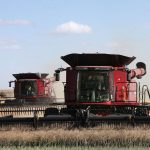A fertilizer product that includes yeast as one of its main ingredients is being tested in Western Canada as a natural supplier of nitrogen, phosphorus and potassium.
NutriSmart, developed by CK Life Sciences of Hong Kong, already is approved commercially in the United States, where it is finding a fit with organic crops and fruit and vegetable production.
Two years of trials have been done in Canada in confined plots, but more trials are needed to establish what applications it might have for western Canadian growers.
Read Also

Agriculture ministers agree to AgriStability changes
federal government proposed several months ago to increase the compensation rate from 80 to 90 per cent and double the maximum payment from $3 million to $6 million
“It’s a promising product,” said Dan Heany, who did the initial trials while at the Olds College Centre for Innovation in Alberta.
“It’s a unique concept.”
NutriSmart comes in the form of granules made of phosphate rock, weathered coal, starch, water and six strains of specially treated yeasts.
Once in the soil, the yeasts in the granules are activated by water. According to information posted on the NutriSmart website, plant roots penetrate the granules and form nodules, which then serve as natural nutrient factories. The yeasts fix nitrogen from the atmosphere, decompose the phosphorus in the granules, release potassium in the soil and produce micronutrients that support the release of macronutrients for plants to absorb.
Rick Tofani, senior vice-president of business development for the Olds College Centre for Innovation, said it is too early to make statements about where NutriSmart might fit in Western Canadian crop production. Specific claims cannot be made before the Canadian Food Inspection Agency approves the product.
“It has potential,” Tofani said. “That’s all I can say.”
Heany, who now works at Norwest Labs in Edmonton, said an appealing feature is its ability to provide nutrients more in step with the crop’s growth and development. Factors that influence crop growth – moisture and temperature – also affect the amount of nutrients resulting from NutriSmart.
Among the places where that could be beneficial, he said, is in more environmentally sensitive areas, where abundant moisture creates a greater risk of nutrients leaching or getting carried away in runoff from fields.
Heany visited China, where NutriSmart was being tested for a variety of crops. It worked well under warmer, moister conditions, he said.
The fertilizer might require more management from producers. For example, the NutriSmart website notes that for some crops and certain growth stages, additional supplementary nutrients may be needed to meet special nutrient requirements of crop growth and development.
“It needs to be tested and validated in Canada to make sure it has a place,” Heany said.
















